11 Apr2016
By Matthew Wales
Last year, AACTE received 400 session proposals for the 2016 Annual Meeting in Las Vegas. Given the limited number of spaces available for presentations, we were able to accept only 53% of the proposals.
Looking to present at AACTE’s 2017 Annual Meeting in Tampa? Want to make your proposal stand out from other proposals received? Here are five tips to help your proposal rise to the top:
05 Apr2016
By Amanda Lester
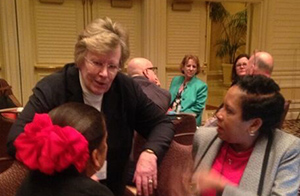
Facilitator Angela Sewall talks with participants in the Wallace-sponsored preconference event
Prior to the start of the 68th Annual Meeting, AACTE hosted a daylong workshop titled “Preparing Tomorrow’s Leaders Through School-University Partnerships Educational Leaders Preconference,” sponsored by The Wallace Foundation. The event was attended by more than 125 PK-12 and higher education leaders from across the nation, including school-university partners who attended together with the goal of strengthening their collaboration in principal preparation programs.
The event agenda featured a series of presentations and interactive PK-24 “table talk” discussions, focused on examining aspects of clinical practice and effective partnerships to advance principal preparation. Participants explored topics such as these:
05 Apr2016
By Lillian Chenoweth
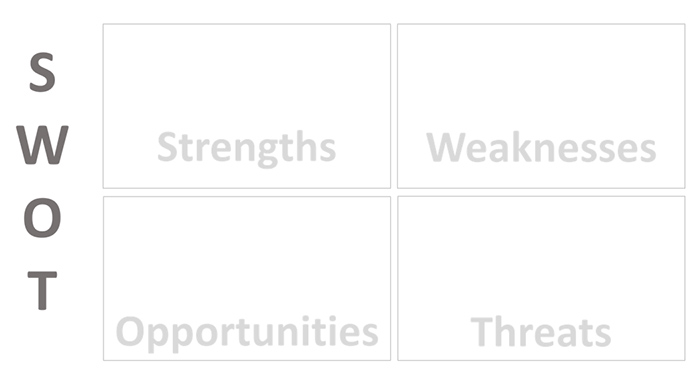
Image From the SWOT Analysis Template
Source: OPS #3: Creating a Quality Assurance System
Have you ever been to a workshop that offered a Make-and-Take: Make a project, wrap it up, and take it home? In AACTE’s Online Professional Seminars (OPSs), you can do just that. The models and other resources shared in these short courses allow you to select materials for immediate application in your own setting, download them in user-friendly files, and then share with colleagues at your home institution.
29 Mar2016
By Jerrica Thurman
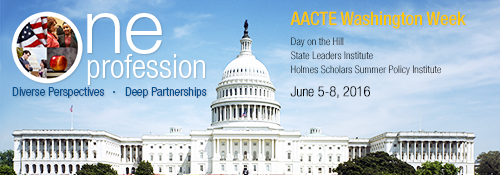 Registration is now open for AACTE’s Washington Week, a set of advocacy-focused events held annually in the nation’s capital. Under the theme “Diverse Perspectives, Deep Partnerships, One Profession,” this year’s Washington Week will be held June 5-8 at the Crystal Gateway Marriott in Arlington, VA, and on Capitol Hill. Please join us to deliberate on provocative issues in the profession, experience interactive sessions with industry leaders, and showcase your work with legislators.
Registration is now open for AACTE’s Washington Week, a set of advocacy-focused events held annually in the nation’s capital. Under the theme “Diverse Perspectives, Deep Partnerships, One Profession,” this year’s Washington Week will be held June 5-8 at the Crystal Gateway Marriott in Arlington, VA, and on Capitol Hill. Please join us to deliberate on provocative issues in the profession, experience interactive sessions with industry leaders, and showcase your work with legislators.
22 Mar2016
By Jerrica Thurman
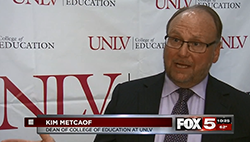 In advance of the 68th Annual Meeting, AACTE held a press briefing last month at the University of Nevada, Las Vegas, focused on educator preparation providers’ work to address the teacher shortages in Nevada. Panelists discussed the challenges they face and innovative solutions under way to meet the urgent demand for qualified teachers in the state’s two largest counties and in both rural and urban areas.
In advance of the 68th Annual Meeting, AACTE held a press briefing last month at the University of Nevada, Las Vegas, focused on educator preparation providers’ work to address the teacher shortages in Nevada. Panelists discussed the challenges they face and innovative solutions under way to meet the urgent demand for qualified teachers in the state’s two largest counties and in both rural and urban areas.
Presented by AACTE in partnership with member institutions in the state, the briefing featured an interactive panel discussion moderated by Mark LaCelle-Peterson, AACTE senior vice president for policy and programs, with the following panelists:
- Kenneth Coll, Dean, College of Education, University of Nevada, Reno
- Kim Metcalf, Dean, College of Education, University of Nevada, Las Vegas
- Dennis Potthoff, Dean, School of Education, Nevada State College
- Thomas Reagan, Dean of Arts and Sciences, Great Basin College
- Staci Vesneske, Former Chief Human Resources Officer, Clark County School District, on special assignment to the superintendent’s office
21 Mar2016
By Whitney Watkins and Omar Davis
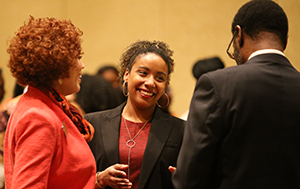 During last month’s AACTE Annual Meeting, the Holmes Program preconference events brought together 74 Holmes Scholars, at least 15 coordinators, and numerous alumni from across the nation. The events, facilitated by the Holmes Scholars Council, AACTE, and the National Association of Holmes Scholars Alumni (NAHSA), included participants from 17 member institutions, more than a dozen presenters, and the program’s first cohort of undergraduate students, known as Holmes Honors students. Attendees shared their research, held a variety of formal and informal meetings, and elected new leaders for the coming year.
During last month’s AACTE Annual Meeting, the Holmes Program preconference events brought together 74 Holmes Scholars, at least 15 coordinators, and numerous alumni from across the nation. The events, facilitated by the Holmes Scholars Council, AACTE, and the National Association of Holmes Scholars Alumni (NAHSA), included participants from 17 member institutions, more than a dozen presenters, and the program’s first cohort of undergraduate students, known as Holmes Honors students. Attendees shared their research, held a variety of formal and informal meetings, and elected new leaders for the coming year.
While attending, we observed the act of relationship building during program sessions and after hours where the new relations began to take root. Participants were clearly excited about the opportunities to connect with peers from around the nation and to participate in conference sessions that were inspiring and powerful. Representatives from AACTE and NAHSA answered what seemed like endless inquiries about program implementation and growth strategies. Considering the overall feedback from participants, all in attendance walked away with a wealth of knowledge as well as new friends and colleagues.
18 Mar2016
By Linda McKee
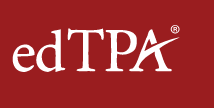 The growing conversation, contentious or not, in the teacher preparation community at large about how to prepare great educators is good for the profession and PK-12 students—and is also helping to improve edTPA support and assessment, Stanford University’s Ray Pecheone told 350 educators at the recent AACTE Annual Meeting.
The growing conversation, contentious or not, in the teacher preparation community at large about how to prepare great educators is good for the profession and PK-12 students—and is also helping to improve edTPA support and assessment, Stanford University’s Ray Pecheone told 350 educators at the recent AACTE Annual Meeting.
Pecheone, executive director of the Stanford Center for Assessment, Learning, and Equity (SCALE), said during the February 25 edTPA breakfast session, “The fact that the profession is having this dialogue about what makes an effective teacher is critical. Engage it! Embrace it! Through this dialogue edTPA has gotten better. It’s a continuous improvement model.”
15 Mar2016
By Kristin McCabe
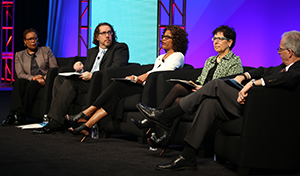 Members of the AACTE Executive Committee held a Town Hall Meeting February 24 at the AACTE 68th Annual Meeting in Las Vegas, providing updates to the membership on key work of the Association and answering questions submitted by the audience on various programmatic and professional issues.
Members of the AACTE Executive Committee held a Town Hall Meeting February 24 at the AACTE 68th Annual Meeting in Las Vegas, providing updates to the membership on key work of the Association and answering questions submitted by the audience on various programmatic and professional issues.
AACTE President/CEO Sharon P. Robinson opened the session with her annual “state of the Association” report. She announced that membership numbers are up to 823 institutional and 32 affiliate members and that several exciting new initiatives are under way—replacing or updating others to be more responsive to member needs. The long-operating Professional Education Data System (PEDS), for example, is now suspended in favor of a new data initiative that will aggregate and report on existing data sets, create benchmarking potential for programs, and more.
15 Mar2016
By Michelle Kotek
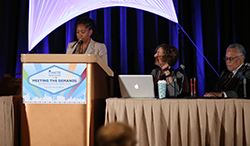 AACTE’s 2016 Annual Meeting in Las Vegas, Nevada, addressed the demands of professional practice and the tough questions that face educators on a variety of fronts. On February 24, the editors of the Journal of Teacher Education (JTE)chose to focus their major forum on “Equity, Access, and the Digital Divide: Challenges for Teacher Education,” bringing together panelists from around the country who are working to close opportunity gaps for young people relative to—and through—the use of technology.
AACTE’s 2016 Annual Meeting in Las Vegas, Nevada, addressed the demands of professional practice and the tough questions that face educators on a variety of fronts. On February 24, the editors of the Journal of Teacher Education (JTE)chose to focus their major forum on “Equity, Access, and the Digital Divide: Challenges for Teacher Education,” bringing together panelists from around the country who are working to close opportunity gaps for young people relative to—and through—the use of technology.
After JTE Coeditor Gail Richmond of Michigan State University introduced the panelists, the discussion started with Hardin Coleman, dean and professor in the School of Education at Boston University (MA). He spoke about shared characteristics of gap-closing schools, accreditation standards, and the steps he sees as necessary to close the technological gap. Coleman suggested focusing on the role of educators in the gap-closing process, deep engagement with educational partners, and supporting the systems of data that will inform progress. He championed efforts to create education systems that will provide a high-quality learning experience for all children.
14 Mar2016
By Jerrica Thurman
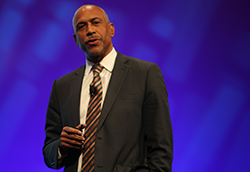 The Welcoming Session kicked off the AACTE 68th Annual Meeting with a keynote from Pedro Noguera, distinguished professor at the University of California Los Angeles and one of the nation’s most important voices on education and equity issues.
The Welcoming Session kicked off the AACTE 68th Annual Meeting with a keynote from Pedro Noguera, distinguished professor at the University of California Los Angeles and one of the nation’s most important voices on education and equity issues.
Noguera challenged the audience to take a closer look at what it means to be a highly effective teacher. As the American student population becomes increasingly diverse and opportunities remain profoundly unequal, he argued that more teachers must have the ability to teach effectively across race, class, language, and cultural differences.
“The best teachers teach the way students learn rather than expecting students to learn the way they teach,” Noguera said.
09 Mar2016
By Kristin McCabe
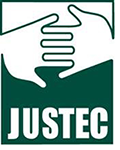 The 28th annual seminar of the Japan-U.S. Teacher Education Consortium (JUSTEC) will be held November 4-7, 2016, at Japan’s Ehime University. Conference organizers invite proposals for paper and poster presentations by May 15 under the theme “Collaborative Teacher Education With Local Communities.”
The 28th annual seminar of the Japan-U.S. Teacher Education Consortium (JUSTEC) will be held November 4-7, 2016, at Japan’s Ehime University. Conference organizers invite proposals for paper and poster presentations by May 15 under the theme “Collaborative Teacher Education With Local Communities.”
This year’s theme is conceptualized this way:
When we look at trends in formal education, the centralized administrative approach prevails more and more in both the United States and Japan. Such an approach has been pointed out by a number of reports to often produce detachment of teachers’ practices from local conditions and needs. On the other hand, when we look into region-oriented alternative approaches, we can still discover a considerable number of successful cases with alternative methods. JUSTEC 2016 sets a conference theme, “Collaborative Teacher Education with Local Communities,” to explore regionally developed teacher education practices, created with local schools and related parties.
08 Mar2016
By Melvin Bogard and Amanda Lester
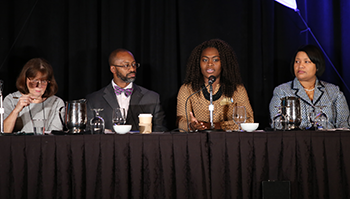
Holmes Scholar Whitney Watkins shares a student’s perspective during a major forum at the AACTE 68th Annual Meeting
Over the past few years, AACTE has been leading efforts to advance teacher diversity in the education workforce through the establishment of the AACTE Black and Hispanic/Latino Male Teachers Initiative Networked Improvement Community (NIC) and the expansion of the AACTE Holmes Program. Both initiatives are dedicated to increasing the recruitment and retention of educators from historically underrepresented groups into the education profession. The NIC’s work is identifying and testing strategies to increase the recruitment and retention of Black, Hispanic, and Latino males in the teaching workforce, and the Holmes Program supports aspiring educators at various points in their education careers to enter teaching, administration, policy, and the professoriate.
08 Mar2016
By Amanda Zullo
As a practicing high school classroom teacher, I have made it a point to be aware of educational happenings. When the Common Core standards were introduced I learned what they were and whom they affected and thought about the impacts on how I would teach the upcoming students. As edTPA and other higher education reforms began to occur I registered to score edTPA to learn about what it was. I continued to monitor the higher education landscape from a distance. I remained in close contact with three institutions of higher education where conversations would dabble in shifts but never seemed to be too urgent.
Looking from the outside in, it is easy to deduce why you think certain things are occurring. Prior to attending the AACTE Annual Meeting, I had some experience working in teacher preparation during the summer and by hosting preservice teachers. I updated my knowledge of changes in law during my fall focus groups, researched factors impacting teacher preparation that connected findings from our Hope Street Group Teacher Preparation Report, and even spoke with individuals who worked within teacher prep at various universities within New York State. I perceived myself as well informed with (as always) some room for growth.
08 Mar2016
By Kristin McCabe
AACTE Government Relations Director Deborah Koolbeck will offer three free webinars this month for AACTE members. Register online to learn about the latest goings-on in Washington and how you can enlist policy makers to cosponsor legislation.
08 Mar2016
By Melvin Bogard
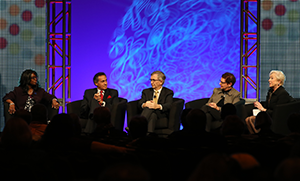 The AACTE Speaker Spotlight Session ended the 68th Annual Meeting February 25 by focusing on the tough questions facing educator preparation across the nation. Panelists urged the audience to tackle complex issues by addressing them as a community, going beyond a one-dimensional viewpoint. They expressed what they saw as the greatest challenges facing the field, ways to enhance the educator pipeline, and models that will foster growth within the education workforce.
The AACTE Speaker Spotlight Session ended the 68th Annual Meeting February 25 by focusing on the tough questions facing educator preparation across the nation. Panelists urged the audience to tackle complex issues by addressing them as a community, going beyond a one-dimensional viewpoint. They expressed what they saw as the greatest challenges facing the field, ways to enhance the educator pipeline, and models that will foster growth within the education workforce.
The panel was moderated by Nancy Zimpher, chancellor of the State University of New York. Panelists included National Board Certified Teacher Cheryl Redfield from Highland Junior High (AZ); Daniel A. Domenech, executive director of AASA: The School Superintendents Association; Anthony S. Bryk, president of the Carnegie Foundation for the Advancement of Teaching, and Carol Basile, dean and professor in the College of Education at the University of Missouri Saint Louis.










 In advance of the 68th Annual Meeting, AACTE held a press briefing last month at the University of Nevada, Las Vegas, focused on educator preparation providers’ work to address the teacher shortages in Nevada. Panelists discussed the challenges they face and innovative solutions under way to meet the urgent demand for qualified teachers in the state’s two largest counties and in both rural and urban areas.
In advance of the 68th Annual Meeting, AACTE held a press briefing last month at the University of Nevada, Las Vegas, focused on educator preparation providers’ work to address the teacher shortages in Nevada. Panelists discussed the challenges they face and innovative solutions under way to meet the urgent demand for qualified teachers in the state’s two largest counties and in both rural and urban areas. During last month’s AACTE Annual Meeting, the Holmes Program preconference events brought together 74 Holmes Scholars, at least 15 coordinators, and numerous alumni from across the nation. The events, facilitated by the Holmes Scholars Council, AACTE, and the National Association of Holmes Scholars Alumni (NAHSA), included participants from 17 member institutions, more than a dozen presenters, and the program’s first cohort of undergraduate students, known as Holmes Honors students. Attendees shared their research, held a variety of formal and informal meetings, and elected new leaders for the coming year.
During last month’s AACTE Annual Meeting, the Holmes Program preconference events brought together 74 Holmes Scholars, at least 15 coordinators, and numerous alumni from across the nation. The events, facilitated by the Holmes Scholars Council, AACTE, and the National Association of Holmes Scholars Alumni (NAHSA), included participants from 17 member institutions, more than a dozen presenters, and the program’s first cohort of undergraduate students, known as Holmes Honors students. Attendees shared their research, held a variety of formal and informal meetings, and elected new leaders for the coming year. The growing conversation, contentious or not, in the teacher preparation community at large about how to prepare great educators is good for the profession and PK-12 students—and is also helping to improve edTPA support and assessment, Stanford University’s Ray Pecheone told 350 educators at the recent AACTE Annual Meeting.
The growing conversation, contentious or not, in the teacher preparation community at large about how to prepare great educators is good for the profession and PK-12 students—and is also helping to improve edTPA support and assessment, Stanford University’s Ray Pecheone told 350 educators at the recent AACTE Annual Meeting.


 The 28th annual seminar of the
The 28th annual seminar of the 
 The
The